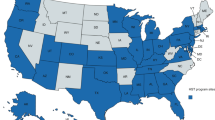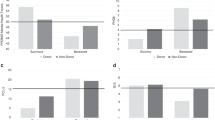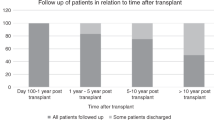Abstract
Chairpersons of the hospital ethics committees (HECs) and BMT clinicians were compared with regard to their willingness to proceed with allogeneic BMT given select psychosocial risk factors. A self-administered questionnaire was sent to 62 HEC chairpersons at hospitals with an accredited BMT program; the response rate was 37%. Items included background information, followed by six case vignettes from a 2006 national survey on which BMT physicians, nurses and social workers agreed not to proceed with allogeneic BMT on the basis of the following risk factors: suicidal ideation; use of addictive, illicit drugs; history of non-compliance; absence of a caregiver; alcoholism; and mild dementia from early onset of Alzheimer's disease. Opinions regarding transplant differed in one case only, in a patient with mild dementia; 27% of HEC chairpersons recommended not proceeding with BMT, which was significantly lower than that of nurses (68%, P<0.001), physicians (63.5%, P<0.001) and social workers (51.9%, P=0.05). Qualitative data show patterns of informal reasoning, linking transplant decisions to patient's responsibility for their psychosocial risk factor(s), as well as to medical benefit and outcome.
This is a preview of subscription content, access via your institution
Access options
Subscribe to this journal
Receive 12 print issues and online access
$259.00 per year
only $21.58 per issue
Buy this article
- Purchase on Springer Link
- Instant access to full article PDF
Prices may be subject to local taxes which are calculated during checkout
Similar content being viewed by others
References
Bolwell BJ . Are predictive factors clinically useful in bone marrow transplantation? Bone Marrow Transplant 2003; 32: 853–861.
Foster LW, McLellan L, Rybicki L, Dabney J, Welsh E, Bolwell B . Allogeneic BMT and patient eligibility based on psychosocial criteria: a survey of BMT professionals. Bone Marrow Transplant 2006; 37: 223–228.
Schulz-Kindermann F, Hennings U, Ramm G, Zander AR, Hasenbring M . The role of biomedical and psychosocial factors for the prediction of pain and distress in patients undergoing therapy and BMT/PBSCT. Bone Marrow Transplant 2002; 29: 341–351.
Syrjala KL, Chapko MK, Vitaliano PP, Cummings C, Sullivan KM . Recovery after allogeneic marrow transplantation: prospective study of predictors of long-term physical and psychosocial functioning. Bone Marrow Transplant 1993; 11: 319–327.
Sullivan AK, Szkrumelak N, Hoffman LH . Psychological risk factors and early complications after bone marrow transplantation in adults. Bone Marrow Transplant 1999; 24: 1109–1120.
Gregurek R, Labar B, Mrsic M, Batinic D, Ladika I, Bogdanic V et al. Anxiety as a possible predictor of acute GVHD. Bone Marrow Transplant 1996; 18: 585–589.
Colon EA, Callies AL, Popkin MK, McGlave PB . Depressed mood and other variable related to bone marrow transplantation survival in acute leukemia. Psychosomatics 1991; 32: 420–425.
Loberiza FR, Rizzo JD, Bredeson CN, Antin JH, Horowitz MM, Weeks JC et al. Association of depressive syndrome and early deaths among patients after stem-cell transplantation for malignant diseases. J Clin Oncol 2002; 20: 2118–2126.
Foster LW, McLellan LJ, Rybicki LA, Sassano DA, Hsu A, Bolwell BJ . Survival of allogeneic bone marrow transplant patients: the relative importance of in-hospital lay care-partner support. Journal of Psychosoc Oncol 2004; 22: 1–20.
Andrykowski MA, Brady MJ, Henslee-Downey PJ . Psychosocial factors predictive of survival after allogeneic bone marrow transplantation for leukemia. Psychosom Med 1994; 56: 432–439.
Molassiotis A, van den Akker OBA, Milligan DW, Goldman JM . Symptom distress, coping style and biological variables as predictors of survival after bone marrow transplantation. J Psychosom Res 1997; 42: 275–285.
Neuser J . Personality and survival time after bone marrow transplantation. J Psychosom Res 1988; 32: 451–455.
Tschuschke V, Hertenstein B, Arnold R, Bunjes D, Denzinger R, Kaechele H . Associations between coping and survival time of adult leukemia patients receiving allogeneic bone marrow transplantation: results of a prospective study. J Psychosom Res 2001; 50: 277–285.
Chang G, Antin H, Orav EJ, Randall U, McGarigle C, Behr HM . Substance abuse and bone marrow transplant. Am J Drug Alcohol Abuse 1997; 23: 301–308.
Hoodin F, Kalbfleisch KR, Thrornton J, Ratanatharathorn V . Psychosocial influences on 305 adults’ survival after bone marrow transplantation; depression, smoking, and behavioral self- regulation. J Psychosom Res 2004; 57: 145–154.
Dossetor JB . Psychosocial patient selection criteria in clinical practice guidelines: an ethical basis for rationing? CMAJ 2001; 164: 642–643.
Bardon A . Ethics education and value prioritization among members of US hospital ethics committees. Kennedy Institute of Ethics Journal 2004; 14: 395–406.
Waller B . Responsibility and health. Cam Q Healthc Ethics 2005; 14: 177–188.
Sadler TD, Zeidler DL . Patterns of informal reasoning in the context of socioscientific decision making. J Res Sci Teach 2005; 42: 112–138.
Baker R, McCullough L . Medical ethics’ appropriation of moral philosophy: The case of the sympathetic and the unsympathetic physician. Kennedy Inst Ethics J 2007; 17: 3–22.
Author information
Authors and Affiliations
Corresponding author
Rights and permissions
About this article
Cite this article
Foster, L., McLellan, L., Rybicki, L. et al. Ethical reasoning about patient eligibility in allogeneic BMT based on psychosocial criteria. Bone Marrow Transplant 44, 607–612 (2009). https://doi.org/10.1038/bmt.2009.58
Received:
Revised:
Accepted:
Published:
Issue Date:
DOI: https://doi.org/10.1038/bmt.2009.58
Keywords
This article is cited by
-
Patient eligibility for hematopoietic stem cell transplantation: a review of patient-associated variables
Bone Marrow Transplantation (2019)
-
A challenge to discriminating psychosocial eligibility criteria: exploring the ethical justification for excluding patients with psychosocial risk factors from hematopoietic cell transplantation
Bone Marrow Transplantation (2018)
-
Psychosocial risk predicts high readmission rates for hematopoietic cell transplant recipients
Bone Marrow Transplantation (2018)



